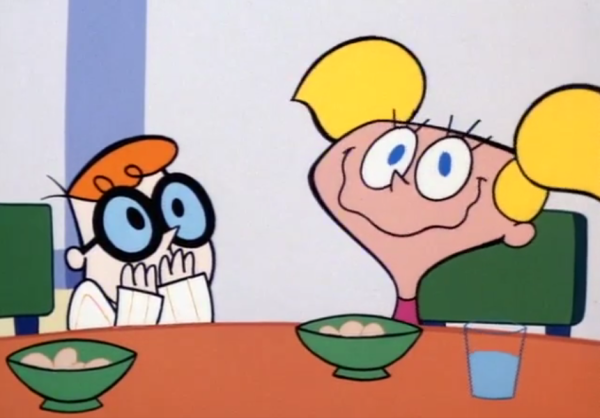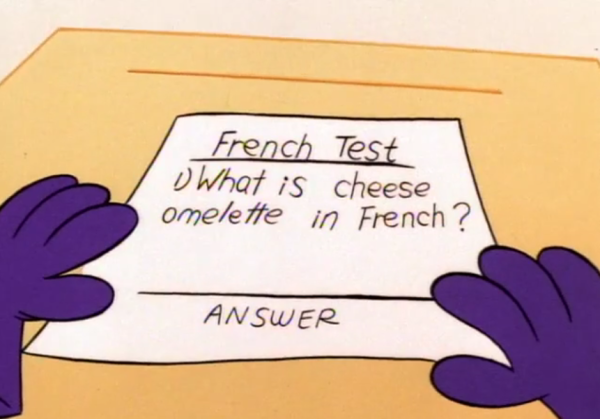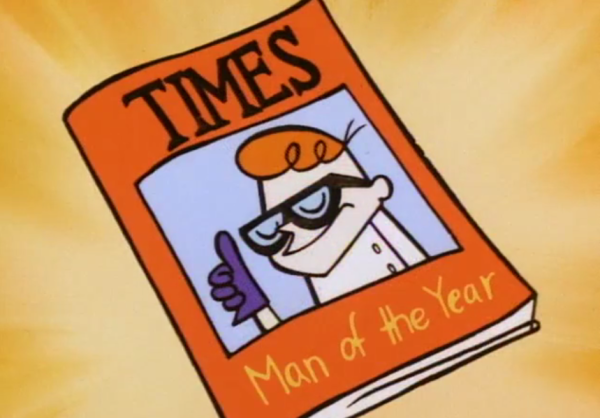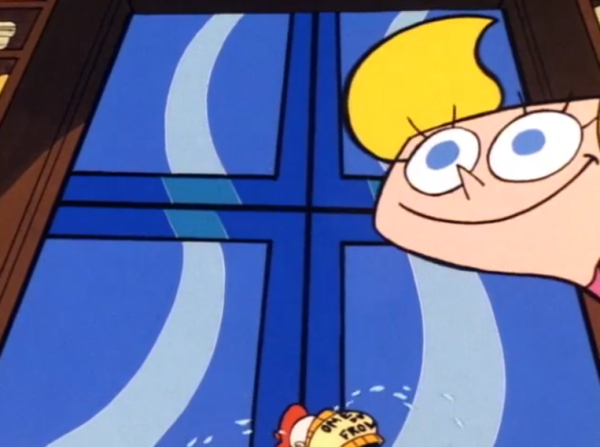Dexter’s Laboratory (S1E9) – Doll House Drama… by ClassicCartoonChannel
Dexter’s Laboratory staked its claim in the animation landscape with one simple phrase. It wasn’t a meaningful phrase, and by itself, it wasn’t particularly funny. It’s a phrase that’s pretty innocuous, a nothing of a phrase that nevertheless feels like the culmination of everything the show was trying (and managed) to be. That phrase, you may have guessed, is cheese omelet, or as you would say in French: “omelette du fromage.”
Dexter’s Laboratory is perhaps one of the most important cartoons of the mid 90s, a bold, stark, animated show defined by the direct, specific use of simple shapes, harsh editing, and dramatic visual irony. It’s a show comfortable with a certain “throwaway approach” to character design consistency: characters could change size, even shape, as long as the gags would hit, and hit hard. Dexter’s lab itself always changed, never once looking the same from episode to episode – even how you entered the lab changed through the series (shades of the various, comical ways Perry the Platypus would enter his own underground hideout in Phineas and Ferb). Most animated shows in the post-Dexter’s Laboratory world will mimic or copy the look but not the style, and certainly not the subject, creating a lot of basic, sharp-angled, sloppy shows that more or less were done as a cost-cutting maneuver. Dexter’s Laboratory was (one of the) first, and Genndy Tartakovsky honed his skills here, sharping his timing, pacing, and framing to create iconic sensibilities in the more critically-known Samurai Jack.

We cannot dismiss what Dexter’s Laboratory was doing when hit CN all those years ago. It’s difficult to think about it now, with so many cartoons on the air these days, but even back then the show was playing smart and coy with what kids animation was doing, and could do. It played into a lot of animation tropes, both Western and Eastern, only to undercut them with a narrative twist, a comically sudden beat, or with something so average, so anti-climatic, that you found yourself wondering if you somehow missed the actual ending. Even back then, cartoons were doing some interesting and crazy things, mostly in terms of narrative commitment, but Dexter’s Laboratory looked backwards towards classic cartoon formatting and style for inspiration. Episodes will be split between several shorts, most about Dexter and his family, but other character and show types, including “The Justice Friends” and “Dial M for Monkey.” The rhythms of the entire show will move somewhat like Rocky & Bullwinkle, an assortment of short animated bits, a format mimicked and copied all throughout the Hanna-Barbera era.
Watching the entire episode – which includes “Doll House Drama,” “Krunk’s Date,” and a brief sequence parodying comic book ads disguised as actual comics – I’m struck by the degree in which Dexter’s Laboratory really engages in that classic format. Not just in the ideas of each episode, but even in the stunted movements and somewhat off-kilter edits. The rhythms would definitely be familiar to those who grew up watching something like The Banana Splits or Yogi’s Gang. “Krunk’s Date,” in particular, utilizes a lazy, “limited laugh track” to ostensibly shore up the comedy, but is obviously used ironically here. Dexter’s Laboratory is more committed to its comic beats here than those shows would ever be, and those first two episodes ends on somewhat odd, downbeat gags that feel different than the “sad trombone” gags of its predecessors.

Then we get to “The Big Cheese,” an episode that hilariously steers into its one-note gag to an insane degree – only to snatch it away, hard and without warning. Rewatching this episode, I’m also struck with how patient Tartakovsky builds the gag. Dexter puts off his French homework to work on other, “more important” scientific pursuits, although some are really generic chores with complicated names. There’s no “panic” when Dexter realizes he still has to study – he just decides on a fairly normal trope – overnight osmosis. Playing a record that pipes French-lessons into his ears while he sleeps, the record skips over and over when it hits one central phrase: omelette du fromage. By the 90s, we were well in the CD/cassette era, so Dexter using a record for this feels silly, but it is central to the joke, and Dexter has been shown to disregard a lot of basic ideas for the pursuit of higher intelligence. Obviously his arrogance will prove to be his downfall, but “The Big Cheese’s” idea of a downfall is brutal.
Tartakovsky is fully aware of the trope in play, in how most shows would have its main character work around his situation to avoid being caught in one-phras-only mode. So Tarakovsky immediately has Dexter get caught. It’s by his sister, Dee-Dee, and she begins a comic repetition of her own: “That’s all you can say!” she sing-shouts, over and over, and at this point, it’s amusing. There is also a forewarning nature to it, specifically when she pops up during the montage, a sign of bad things to come. But before that point, that montage is a doozy. Montages are a dime a dozen in cartoons, but here, Tartakovsky escalates the absurdity of the situation with some impressive decision. He even starts the absurdity with a test with one single question, then ramps things up in more and more ridiculous ways. Some are a bit obvious, like omelette du fromage being a French town somehow, and the girls in the class being smitten by his use of French. The potential bullies suddenly being scared off by Dexter’s use of the phrase, however, is such a random development, precisely because unlike the previous gags, this one completely lacks any reason to have occurred.
The combination of “maybe this could happen?” and “no way this could happen” results fill up the rest of the montage. Dexter brings world peace. He becomes TIMES Man of the Year. Parades are thrown in his honor. He has a number one hit song that’s composed of, one assumes, just that phrase. It’s so dumb, but there’s a perverse comic value in seeing all the ways Tartakovsky takes this singular bit, pushing and pushing and pushing it to hilarious lengths. And it’s all pretty fantastic… up until the final moments. (I do want to point out that before Dexter enters his home, he kisses a baby, then drops it, as cameras flash. I feel like that’s a key visual sign for the next scene, but I think I’m really over-reading what amounts to a simple, hilarious joke-within-a-joke).

It’s in those final moments though that things turn against Dexter – the karmic, schadenfreude moment that takes thing perhaps too far. Outside his lab, the young scientist learns that his solitary word usage isn’t the password to enter his lab. His computer not only locks the lab up tighter, it begins a self-destruct sequence. Dexter, panicking and in literal tears, shouts in desperation, but only “omelette du fromage” can escape his lips. And then his sister pops up. She begins reciting in comically dark fashion the very phrase she’s been repeating all day, “That’s all you can say.” Unhelpful and useless. And if you were expecting a saving grace, a final reprieve that saves Dexter’s lab and allows the child to learn a lesson in the relative clear… it does not come. The computer says “one.” The lab completely explodes. Dexter and Dee-Dee are visible through a massive hole in their house. Fade to black. THE END pop on screen, “That’s all you can say” echoing silently in the background.
It’s pretty ridiculous in a sense. It’s a cartoon, and developing sympathy for Dexter and his lab, particularly after an episode where he skates by on a French phrase through success after success, comes across as a little weird. Dexter doesn’t really hurt anyone (except that baby, which maybe is worth discussing), and other than his hubris, there’s the question of whether the karmic destruction of his life’s work is proportional punishment to his behavior. It really isn’t his fault that he got famous off the phrase. There’s a lot to be said about the public’s infatuation over such a dumb, singular concept – and I should remind you that this episode took places years before social media and “going viral” was a thing. [I really want to do a piece about how cartoons portray crowds and public reactions; there’s a difference between mob mentality and blindly following a large group for gag purposes.] This is reminiscent of The Simpsons’ “Bart Gets Famous,” in which Bart experiences the highs and lows of success brought about by his own oft-repeated motto “I didn’t do it,” but that show had the time to draw into the reluctance and complexity of Bart’s feelings towards his entire “fifteen minutes.” With “The Big Cheese,” Tartakovsky had three minutes to get to his point, and he focused on the perfect visual display of the rise and fall of success – the fall embodied in a dark, destructive moment that shocked a young generation.

Perhaps “proportional punishment” isn’t really a thing. Sometimes you find yourself so caught up in something that you fail to realize how far you are from the things you once held dear – and they’re gone in an instant. Tartakovsky made his point clear, and it left many people with only “omelette du fromage” and “that’s all you can say” dancing in their heads, in the midst of a dark, music-less void. The very premise of the show, Dexter’s Laboratory, was gone in an instant, leaving kids to wonder if, and why, such a bleakness was warranted. As an adult, we wonder about it still.
NEXT: Rescue Rangers’ uses a badass Gadget Hackwrench to contemplate the value of religion in “The Case of the Cola Cult.”
Comments are closed